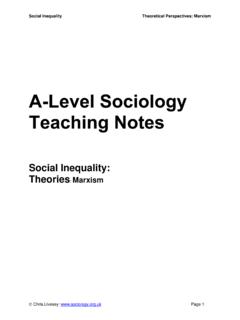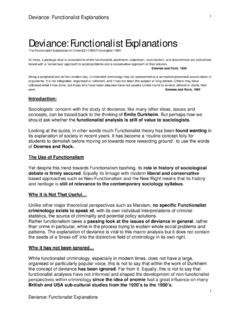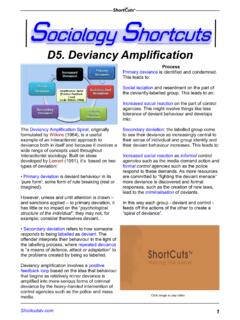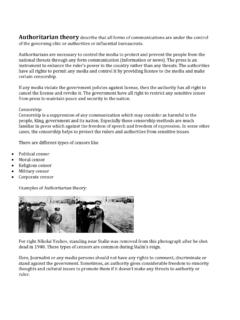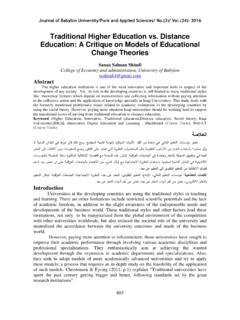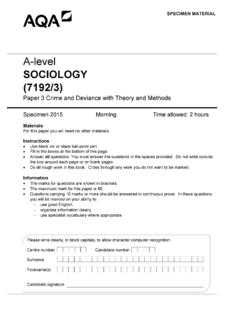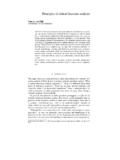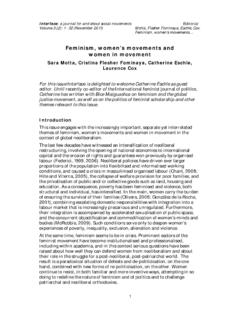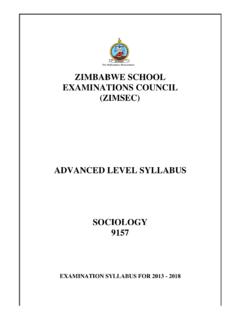Transcription of Major Schools of Thought: Marxism. - Sociology
1 Major Schools of thought : Marxism. Marxism is a body of social, political, and economic thought derived from the writings of Karl MARX and his collaborator, Friedrich ENGELS. Various Schools of Marxism have emerged since Marx's death in 1883. Many of these remain influential today . At the centre of Marx's work is his analysis of CAPITALISM: how it arose, how it works (for whom it works better and for whom worse), and where it is likely to lead. Concentrating on the social and economic relations in which people earn their livings, Marx saw behind capitalism's legal facade a struggle of two main classes: the BOURGEOISIE, who own the productive resources, and the workers, or PROLETARIAT, who must work for wages in order to survive.
2 Marx did recognise the existence of two other classes, the Petty Bourgeoisie and the Lumpen Proletariat, he argued that these two classes would disappear over time. The main theories that make up this analysis-- the theory of alienation, the labour theory of value, and the materialist conception of history --must all be understood with this focus in mind. Even Marx's vision of socialism emerges from his study of capitalism, for socialism is the unrealised potential inherent in capitalism itself for a more rational and egalitarian social order in which people can develop more fully their distinctively human qualities.
3 Some socialist ideas can be traced as far back as the Bible, but Marxism has its main intellectual origins in German philosophy, English political economy, and French utopian socialism. It is from G. W. F. HEGEL that Marx learned a way of thinking about the world, in all its fluid complexity, that is called "dialectics." Adam SMITH's and David RICARDO's view that the values of commodities express the amount of labour time that go into their production underlay Marx's own labour theory of value. From the French utopians, especially Charles FOURIER and the comte de SAINT-SIMON, Marx caught a glimpse of a happier future that lay beyond capitalism.
4 With the paradox of an Industrial Revolution that produced as much poverty as it did wealth, these were the main ingredients that went into the formation of Marxism. MARXIST THEORY Marx's study of capitalism was grounded in a philosophy that was both dialectical and materialist. With dialectics, the changes and interactions that anything undergoes are brought into focus and emphasised, and special attention is devoted to whatever patterns emerge. This method enabled Marx, when examining a particular problem within capitalism, to keep in view both the broader interactions that made up the whole and the past and future development of present phenomena.
5 In this way, capitalism as it unfolded as a system in history becomes the main object of his study. The uneasy tension between the historical forces promoting change and the systemic ones promoting equilibrium were captured in the idea of "contradiction," understood as a progressive pulling apart of what is functionally united. Unlike Hegel's dialectic, which moved in a world of pure ideas, Marx's dialectic was materialist. Marx was primarily concerned with capitalism as lived rather than as thought about, but people's lives also involve consciousness. Marx's materialism puts ideas back into the heads of living people and treats both as parts of a world that is forever being remade through human activities, particularly in production.
6 In this dialectical process, ideas also affect the social conditions and behaviour that more generally shape them. Alienation Marx's theories about capitalism are best understood as answers to his pointed questions about its nature, effects, and development. How do the ways and conditions in which people earn their living affect their bodies, minds, and daily lives? In the theory of alienation Marx gives his answer. 1. The people who do the work in capitalism own none of the means (machines and raw materials, for example) that they use in their work. 2. These are owned by the capitalists, to whom workers must sell their "labour power," or ability to do work, in return for a wage.
7 3. This system of labour displays four relations that lie at the core of Marx's theory of alienation. 4. The worker is alienated from his or her productive activity, playing no part in deciding what to do or how to do it. 5. The worker is alienated from the product of that activity, having no control over what is made or what becomes of it. 6. The worker is alienated from other human beings, with competition and mutual indifference replacing most forms of co-operation. 7. Finally, the worker is alienated from the distinctive potential inherent in the notion of human being. 8. The severing of these relationships leaves on one side a seriously diminished individual--physically weakened, mentally confused and mystified, isolated and virtually powerless.
8 On the other side of this separation are products and ties with other people, outside the control and lost to the understanding of the worker. In the marketplace the worker's products pass from one hand to another, changing names and form along the way--value, commodity, capital, profit, interest, rent, wage--eventually re-entering the worker's daily life as the landlord's house, the grocer's food, the boss's factory, and the various laws and customs that prescribe relations with other people. The world that the worker has made and lost reappears in the misunderstood form of private property to serve as the necessary conditions for reproducing his or her own alienation.
9 Theory of Value What is the effect of the worker's alienated labour on its products, both on what they do and on what can be done with them? Smith and Ricardo used the labour theory of value to explain broad price ratios. Marx took this explanation more or less for granted; his labour theory of value is primarily concerned with the more basic problem of why goods have prices at all. The slave owner takes by force what slaves produce. The feudal lord claims as a right some part of what is produced by the serfs. Only in capitalism is the distribution of what is produced a function of markets and prices.
10 Marx's explanation of this anomaly concentrates on the separation of the worker from his or her means of production and the sale of his or her labour power that this separation makes necessary. As a result of this separation, all the things that workers produce become available for exchange, indeed are produced with this exchange in mind. "Value" is the general social form taken by all the products of alienated labour (labour to which the four relations of alienated labour apply). Such products could only sell (have "exchange values") and serve (have "use values") in ways that express and contribute to this alienation.


